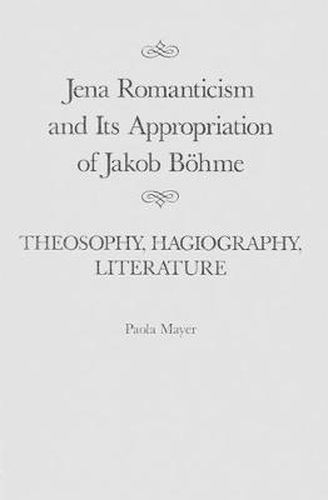Readings Newsletter
Become a Readings Member to make your shopping experience even easier.
Sign in or sign up for free!
You’re not far away from qualifying for FREE standard shipping within Australia
You’ve qualified for FREE standard shipping within Australia
The cart is loading…






These appropriations fall into two main groups: those pertaining to the name Bohme or a life assigned to it, and those involving concepts or images from the mystic’s oeuvre. The first group constituted an attempt to co-opt the aura of sanctity attached to portrayals of the poet-prophet in order to invest Romantic Poesie with the sacral standing of religion. The second group, exemplified by Friedrich Schlegel and Friedrich Schelling, involved the borrowing and radical redefinition of a few concepts and images from Bohme’s work in the hope of bridging the gap between the abstract first principle of idealism and the personal God that became an emotional necessity for both thinkers. Jena Romanticism and Its Appropriation of Jakob Bohme treats the Romantic reception of Bohme as a striking example of how the past is appropriated and rewritten in the service of self-affirmation. Analysing the need and the techniques for this self-affirmation sheds light on the nature of the self to be affirmed and on the content and underlying motivation of the Romantic program.
$9.00 standard shipping within Australia
FREE standard shipping within Australia for orders over $100.00
Express & International shipping calculated at checkout
These appropriations fall into two main groups: those pertaining to the name Bohme or a life assigned to it, and those involving concepts or images from the mystic’s oeuvre. The first group constituted an attempt to co-opt the aura of sanctity attached to portrayals of the poet-prophet in order to invest Romantic Poesie with the sacral standing of religion. The second group, exemplified by Friedrich Schlegel and Friedrich Schelling, involved the borrowing and radical redefinition of a few concepts and images from Bohme’s work in the hope of bridging the gap between the abstract first principle of idealism and the personal God that became an emotional necessity for both thinkers. Jena Romanticism and Its Appropriation of Jakob Bohme treats the Romantic reception of Bohme as a striking example of how the past is appropriated and rewritten in the service of self-affirmation. Analysing the need and the techniques for this self-affirmation sheds light on the nature of the self to be affirmed and on the content and underlying motivation of the Romantic program.